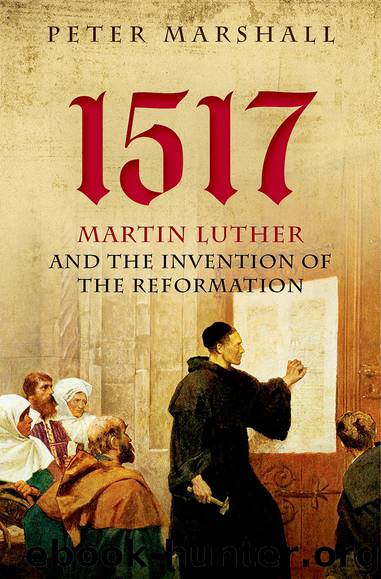1517 by Marshall Peter;

Author:Marshall, Peter;
Language: eng
Format: epub
Publisher: Oxford University Press
Published: 2017-06-02T00:00:00+00:00
In the current age, Quitman was pleased to reflect, ‘the influence of the pope has been declining, and the thunderbolt of the Vatican has lost its terrors’.18
In reflecting on the blessings of the Reformation, American Lutherans generally did consider its precise date of inception to be a significant matter. ‘Would it not be shameful indifference in us’, Quitman asked on 31 October 1817, ‘to let this memorable day pass, without taking honourable notice of that great man, to whom we are so much indebted’? In 1815, the New York Ministerium urged Synods from Pennsylvania and North Carolina to prepare for a joint commemoration on the Sunday ‘nearest to October 31st, 1817’, though it was only in September of the anniversary year that the New York Ministerium determined to have its own celebration on 31 October. This followed a resolution from the Pennsylvania Ministerium to the effect that they were happy to unite with their New York brethren ‘in so far that we would hold the said celebration on the 31st day of October, it being the exact anniversary of the Reformation…and they must be requested to keep with us the very anniversary itself, and not the Sunday following’. The president of the Pennsylvania Synod, George Lochmann, later declared 31 October 1517 to be a day which must be held in grateful remembrance ‘as long as the world exists’. He added that ‘what the 4th day of July, 1776, is and must be to our precious political liberty, that the 31st of October of the year 1517, should be, in respect to our religious liberty’. It is a revealing pairing of dates, suggesting the emergence of multiple ‘sites of memory’ (see pp. 14–15) in the construction of a national narrative, as well as the capacity of public commemorations to reinforce a collective view of history.19
Concern with the ‘exact day’ was not universal—the Special Conference of Evangelical Lutheran preachers in Ohio and Western Pennsylvania resolved to hold their commemoration of ‘the Reformation by the blessed Luther’ in 1817 over the first three days of October. But it testifies nonetheless to the perception that one specific action of Luther’s was the original wellspring from which a veritable river of blessings flowed. Among the works published by American Lutherans at the time of the anniversary was a translation of a popular biography of Luther by Johann Friedrich Wilhelm Tischer, superintendent of the Lutheran Church in Saxony. Tischer made much out of Luther’s ‘bold step’ in posting the Theses. Everyone, he claimed, was simply ‘astonished at the intrepid undertaking’. Reports of it spread through every country ‘with incredible rapidity’. The crucial role played by printing in this process went silently unacknowledged: ‘the greatness of the undertaking itself, and the general complaint against indulgences, but which none had dared to attack, were the cause of the rapid circulation of this news’. Yet at the same time, Tischer’s account betrayed some uncertainty about the meaning of the Thesenanschlag in Luther’s own day. He recognized that Luther’s intention
Download
This site does not store any files on its server. We only index and link to content provided by other sites. Please contact the content providers to delete copyright contents if any and email us, we'll remove relevant links or contents immediately.
| Africa | Americas |
| Arctic & Antarctica | Asia |
| Australia & Oceania | Europe |
| Middle East | Russia |
| United States | World |
| Ancient Civilizations | Military |
| Historical Study & Educational Resources |
Hostage to the Devil by Malachi Martin(1689)
Dark Mysteries of the Vatican by H. Paul Jeffers(1618)
The Apogee - Byzantium 02 by John Julius Norwich(1374)
Angels & Demons by Dan Brown(1125)
The Secret Teachings of All Ages by Manly P. Hall(1108)
Freedom of the Will by Jonathan Edwards(1024)
Book 2 by Unknown(879)
Christian by Sean Michael(852)
Hostage to the Devil: The Possession and Exorcism of Five Contemporary Americans by Malachi Martin(827)
Life Stories by unknow(817)
Demonology, by King James I(783)
The Nag Hammadi Scriptures by Meyer Marvin W. & Robinson James M(773)
A Cup of Trembling by Dave Hunt(763)
The World's Sixteen Crucified Saviors by Graves Kersey(730)
Heaven and Hell: A History of the Afterlife by Bart D. Ehrman(691)
Guilt by Association(671)
Catholicism For Dummies by Rev. John Trigilio Jr. & Kenneth Brighenti(663)
The Nag Hammadi Scriptures by Marvin W. Meyer & James M. Robinson(654)
The Color of Compromise by Jemar Tisby(651)
